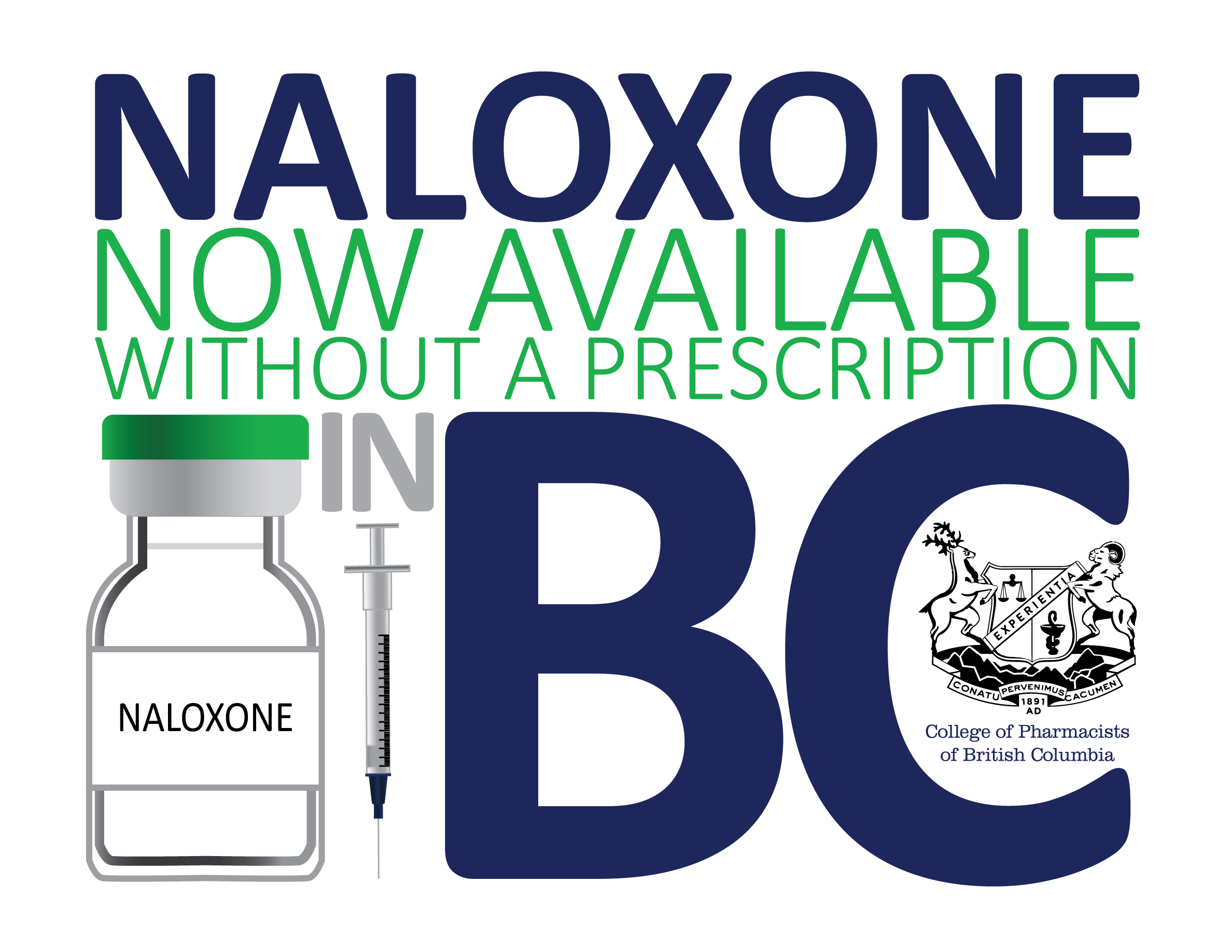|
Naloxone resources are now available here: http://www.bcpharmacists.org/naloxone |
Naloxone, the life-saving drug used to reverse the effects of an opioid overdose, is now available in BC without a prescription.
“It was important to make this life-saving drug more widely available in British Columbia. The College worked closely with government and other stakeholders to bring non-prescription naloxone to BC quickly. Now community pharmacies across BC will be able to provide naloxone to anyone seeking it.” - Blake Reynolds, Chair, College of Pharmacists of BC
Check with your local pharmacy for availability.
Health Canada revised the Federal Prescription Drug List on March 22, 2016 to make a non-prescription version of naloxone more accessible to Canadians in support of efforts to address the growing number of opioid overdoses.
To make non-prescription naloxone available in BC, the College of Pharmacists of BC amended BC’s Drug Schedules Regulation to classify non-prescription naloxone as a Schedule II drug. As a result, BC is one of the first provinces in Canada to make non-prescription naloxone available.
Non-prescription naloxone could not have become available in BC this quickly without the close collaboration of Health Canada, the Ministry of Health, BC Centre for Disease Control and patient advocacy groups including the Vancouver Area Network of Drug Users and the BC Association of Persons on Methadone.
“I am very pleased to confirm that as of March 22, 2016 Health Canada has done its part to make naloxone available without a prescription, specifically for emergency use for opioid overdose outside hospital settings. This is a timely, sensible and effective intervention that will help save lives. Our government remains committed to working with provinces and territories, First Nations leadership and other stakeholders to reduce opioid abuse right across Canada. With respect to the changes in British Columbia, I am happy that we share a common goal in reducing the harms associated with opioid abuse.”
- The Honourable Jane Philpott, P.C., M.P.
“Making naloxone more readily available through community pharmacies is a great step forward in addressing opioid overdoses,” said Provincial Health Officer Perry Kendall. “I commend the College of Pharmacists of BC in moving so quickly to make the necessary changes so that more British Columbians can access this live-saving drug. I encourage parents and friends of people who use drugs to visit their local pharmacist for training and include naloxone as part of their first aid kit.”
"We are ecstatic to see both federal and provincial regulations change to increase access to naloxone, especially given the current opioid overdose crisis in Canada. The BC Take Home Naloxone program has trained over 6500 people to recognize and respond to overdoses using naloxone. As a result, 488 overdoses have been reversed since the program's inception, showing that people in a community setting can respond quickly to an overdose and reduce the chances of death or severe brain damage,” said Ashraf Amlani, Harm Reduction Epidemiologist at the BC Centre for Disease Control. “We are proud to collaborate with the College of Pharmacists of BC and other stakeholders on this change which will allow more British Columbians to have access to this essential life-saving medication."
"We are happy to see naloxone is being made widely available without a prescription. It's not just for drug users. No first aid kit is complete without it. This will save lives for sure. It's been a long time coming. I myself have used naloxone to revive nine overdose victims," said Laura Shaver, president of the British Columbia Association for People on Methadone. "We'd like to see the injection device included in a kit, as the cost can be a barrier for some."
The change to non-prescription allows naloxone to be more widely accessible to friends and family of those who may find themselves in an emergency overdose situation. In BC, classifying non-prescription naloxone as Schedule II means naloxone will be available behind the counter and a pharmacist will be required to provide important training and information for the use of the drug. This will ensure appropriate training is provided to patients and other consumers seeking naloxone.
Training is important as the administration requires an intramuscular injection. Currently, non-prescription naloxone is only available in an ampule to be used with a syringe. Other formats that require less training for safe administration could become available at a later time.
It is also essential than anyone administering naloxone call 911 right away. Naloxone may bring on symptoms of withdrawal. It also wears off after 30-75 minutes which means an overdose can return.
The College is working with the Ministry of Health, the BC Centre for Disease Control and patient advocacy groups such as the Vancouver Area Network of Drug Users and the BC Association of Persons on Methadone to provide naloxone educational sessions to pharmacy professionals.
A series of education sessions across BC together with naloxone information and resources to be made available on the College’s website will provide pharmacy professionals with guidance on how to provide training to those seeking naloxone. It will include how to provide training on opioid overdose recognition, importance of calling 911, drug administration (with an ampule and syringe), storage requirements, patient evaluation aftercare and safety.
Over 600 pharmacy professionals have already registered for the educational sessions happening across BC starting in April.
Links
Health Canada’s Notice of Amendment for Naloxone
College of Pharmacists of BC Naloxone Education Session
For further information please contact:
Gillian Vrooman
Director of Communications and Engagement
College of Pharmacists of BC
[email protected]
@bcpharmacists
